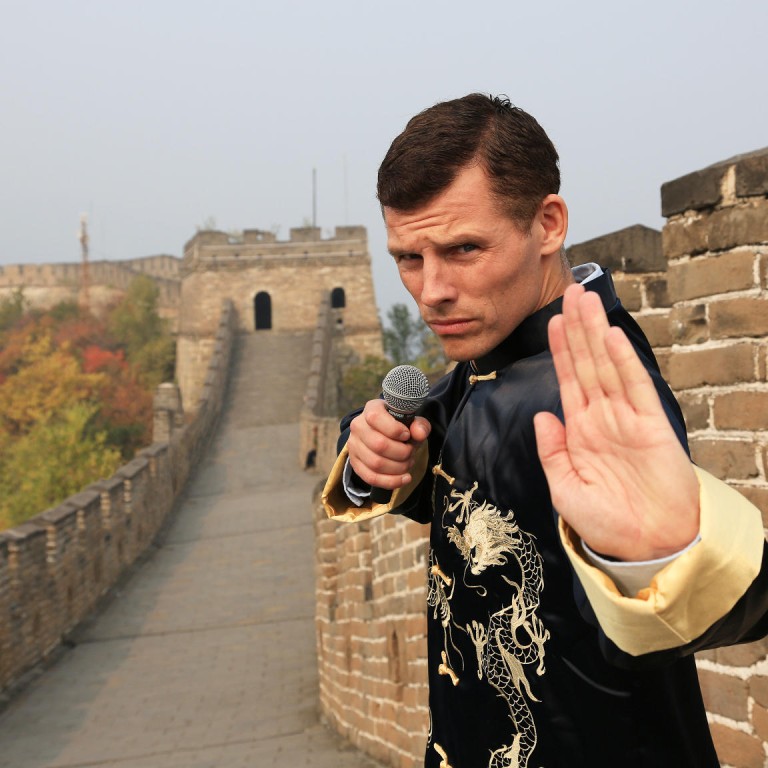
How I scaled the Great Wall of comedy and made Chinese laugh
Irish-American, Putonghua-speaking comedian Des Bishop (a.k.a. Bi Hansheng) tells Dinah Gardner what material works best with Chinese audiences
I was born in London, because my parents were living there at the time. When I was less than a month old, they moved back to New York. They had just been waiting for me to arrive. So I grew up in Flushing, Queens, which coincidentally is now completely Chinese, but wasn't when I was growing up. At 14, after getting kicked out of school - for academic reasons, no big deal - I ended up at a boarding school in Ireland. The government pays for your university in Ireland, so I couldn't really go back to New York and spend US$20,000 a year on college when I could get it for free. I didn't want to, either, so I studied English and history at University College Cork.
I stopped drinking at 19. Most people start then, but I stopped. My first year of college was a washout because of booze. So I went back to New York, got three months sober and then returned to college. I had to repeat my first year. It was through a sober guy - a guy I knew from not drinking - that I got into comedy. I was getting tickets to this comedy club where he was the resident MC and he kind of pushed me into trying stand-up. And once I tried it I couldn't stop. It's very different to acting. There's a massive nerve rush and all that stuff. That was 1997. I quickly decided I would do it for a living. I moved to Dublin in 1998 and became a full-time comedian. I guess there's something in the genes; my father's a performer. In my extended family, funnily enough on both sides, there are a lot of big personalities. My mother says it was kind of always there, teachers used to say it, the priest in our local parish used to say it: they always used to say I would be a politician or a performer - something public.
I used to say ... all the time, "I'd love to learn Chinese, but who has the time, you know?"
I was studying kung fu (after university, in the early 2000s). Our master was from Hong Kong. He used to take us for Chinese food every Sunday after training - dim sum and all that. Then came out and there was a whole revival of kung fu films. All of this came together like a perfect storm right when I met Leo (a Chinese friend who had moved to Ireland). I used to say to Leo all the time, "I'd love to learn Chinese, but who has the time, you know?" But after I learned Gaelic for a TV show ( ), I thought it would be great (to make a comedy show about studying Chinese). For five years, from 2008 to 2013, I was trying to get the money together, then finally Irish TV station RTE came through, and I went to China for a year to film (the show that saw Bishop attend language school and live with a Chinese family in Beijing).
WATCH Bishop in action
In China, I don't really care about English-language stand-up; I only want to do it in Chinese. I've also done an hour (of stand-up) in New Zealand in Chinese, for Chinese people living there. I don't even know what makes the Chinese laugh … I just tell funny stories about my life in China. I'm more of a storyteller than a joke teller. The great thing about China is there's (historically) been no stand-up, so the most common form of stand-up comedy is basic observation - the "that's so true" style of comedy. The Chinese love it if you do a joke about (Chinese) characters because they think it's great that you know anything about them … When I had started going out with a Chinese girl, I did a lot of stuff about that. They love that - like the pitfalls of being in a cross-cultural relationship. Obviously, you can't joke about the government, but you try to push the boundaries a little. I use a lot of comedy tricks, I do a news rap, a rap about the Chinese news, that goes down well. Fame in China is when you really need to worry about things. Right now stand-up comedy is so low profile it's not really an issue.
Every Chinese comedian has way too many jokes about pollution, that's probably the most hacked subject in Chinese comedy
I often go on stage with eight (Chinese) comedians. General themes I notice that they tend to joke about would be dating and trying to pick up girls. The single female comedians talk a lot about the pressure to get married from their parents. You get a lot of stuff about house prices and then there'll be buzzwords from the internet. Every Chinese comedian has way too many jokes about pollution, that's probably the most hacked subject in Chinese comedy today. I think there's a lot of self-deprecating humour among the younger Chinese men particularly, and a very limited amount of "dirty" stuff. They have a supposedly "dirty" show every now and then, but it wouldn't even be considered remotely dirty in the West. They're pretty tame about sexual behaviour.
Stand-up comic excited by mainland comedy potential
I hadn't expected my English language stand-up show to continue this long (it started last year and has since been to Britain, Australia, New Zealand and Ireland). I guess it just has a universal appeal so it keeps having an extended life. I'd probably still be there (China) if I wasn't leaving so much else behind. I love my job.
